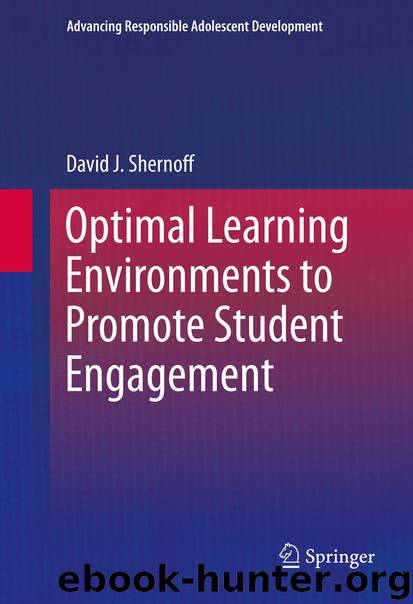Optimal Learning Environments to Promote Student Engagement by David J. Shernoff

Author:David J. Shernoff
Language: eng
Format: epub
Publisher: Springer New York, New York, NY
Engaging Approaches in Core Academic Subjects
With this backdrop, we now proceed to discuss engagement in core academic subjects: history, social studies, science, English, and math. Then, in Chap. 9, we will also discuss increased interest in curriculum in noncore subjects like art, vocational education, and Social and Emotional Learning (SEL).
History
History is the subject most commonly associated with direct instruction. Indeed, teachers rarely use engaging pedagogical approaches in secondary history classes and, not surprisingly, students are rarely engaged in them (Shernoff et al. 2000). Why this should be the case is not quite as obvious, however. As Csikszentmihalyi (1990) noted, observing and recording past events, both large and small, is one of the most common, satisfying ways of bringing order to consciousness, implying that doing history is an inherently flow-evoking activity. Writers from Dewey (1916/1944) to Erik Erikson (1958) to have observed that framing the past with a structured story, including biographies, enriches life with meaning. After encountering it as a core subject in school, however, most students associate history with a dreary set of dates and facts to memorize in order to pass the required tests and courses. In fact, all core subjects are seen as “disciplines” when they come to be seen as separate from enjoyable or intrinsically rewarding spheres of human endeavor. As Dewey suggested, the lack of enjoyment and meaning is derived mainly from isolation: an emphasis on the learning of facts and rules separated from application and meaningful goals in the contexts of daily life in which they are used.
In the case of history, more could be done towards helping students to do history rather than only learn it. In the early year, this might be as simple as keeping a journal and linking events to other recorded events in history. As students move into adolescence, this might involve more of a conscious shift from a stage 2 approach to a stage 3 orientation of doing and practicing some of the basic skills, competencies, and habits of mind that historians do. This might include choosing a historical question to explore, accessing historical records and archives, analyzing data sources, constructing historical narratives, and considering the weight of evidence that supports different possible accounts. Of course, those who actually specialize in history in college and graduate school might also transition into a Stage 4 education of thinking and acting like professional historians and then taking the discipline of history more seriously.
While this shift from a Stage 2 to Stage 3 educational orientation may be needed to some degree in all of the core academic subjects, the challenges with history may run a little deeper. More than in other subjects, content from the distant past is isolated from students’ lives in the present. They come to see history as a collection of wars, treaties, empires, and revolutions without seeing the relevance of these events to the world they inhabit. Even in US history, the Civil War, presidencies, Supreme Court rulings, and civil riots and unrest are all largely seen
Download
This site does not store any files on its server. We only index and link to content provided by other sites. Please contact the content providers to delete copyright contents if any and email us, we'll remove relevant links or contents immediately.
| Administration | Assessment |
| Educational Psychology | Experimental Methods |
| History | Language Experience Approach |
| Philosophy & Social Aspects | Reform & Policy |
| Research |
The Art of Coaching Workbook by Elena Aguilar(51203)
Trainspotting by Irvine Welsh(21679)
Twilight of the Idols With the Antichrist and Ecce Homo by Friedrich Nietzsche(18638)
Fangirl by Rainbow Rowell(9259)
Periodization Training for Sports by Tudor Bompa(8276)
Change Your Questions, Change Your Life by Marilee Adams(7786)
This Is How You Lose Her by Junot Diaz(6891)
Asking the Right Questions: A Guide to Critical Thinking by M. Neil Browne & Stuart M. Keeley(5778)
Grit by Angela Duckworth(5617)
Red Sparrow by Jason Matthews(5478)
Paper Towns by Green John(5194)
Room 212 by Kate Stewart(5129)
Ken Follett - World without end by Ken Follett(4737)
Housekeeping by Marilynne Robinson(4453)
The Sports Rules Book by Human Kinetics(4392)
Papillon (English) by Henri Charrière(4277)
Double Down (Diary of a Wimpy Kid Book 11) by Jeff Kinney(4275)
The Motorcycle Diaries by Ernesto Che Guevara(4105)
Exercise Technique Manual for Resistance Training by National Strength & Conditioning Association(4075)
